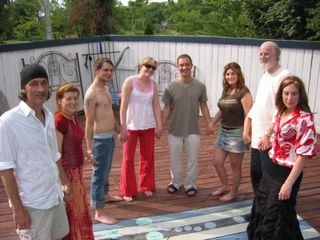If you can disentangle
yourself from your selfish self
all heavenly spirits
will stand ready to serve you
if you can finally hunt downyour own beastly selfyou have the rightto claim Solomon's kingdomyou are that blessed soul whobelongs to the garden of paradiseis it fair to let yourselffall apart in a shattered houseyou are the bird of happinessin the magic of existencewhat a pity when you letyourself be chained and cagedbut if you can break freefrom this dark prison named bodysoon you will seeyou are the sage and the fountain of life— Mevlana Celaleddin Rumi (translated by Nader Khalili)Those who live the inner life have to adopt a certain outer form of living in the world amidst people of all kinds. There are five principle ways known which the spiritual souls adopt to live life in the world, although there are many more ways. Very often these souls are found in such forms of life that one could never imagine for one moment that they were living the inner life. It is for this reason that the wise of all ages have taught respect for every human being, whatever be his outward character, and have advised man to think who is beneath that garb, and what it is.
Among the five principle characteristics of the spiritual being the first is the religious character. This is he who lives the religious life, the life of an orthodox person, like everybody else, showing no outward trace of a deeper knowledge or wider view, though he realizes it within himself. Outwardly he goes to his temple or his church, like everybody else. He offers his prayers to the Deity in the same form as everybody, reads the scriptures in the same way that everybody else does, receives the sacraments and asks for the benediction of the church in the same way that everybody does. He shows no difference, no special characteristics outwardly showing him to be spiritually advanced; but at the same time, while others are doing all their religious actions outwardly, he realizes them in his life in reality. Every religious action to him is a symbolical revelation; prayer to him is a meditation; the scripture to him is his reminder, for the holy Book refers him to that which he reads in life and in nature. And therefore, while outwardly he is only a religious man like everybody in the world, inwardly he is a spiritual man.
Another aspect of a spiritual man is to be found in the philosophical mind. He may show no trace at all of orthodoxy or piety; he may seem to be quite a man of the world in business, or in the affairs of the worldly life. He takes all things smoothly, he tolerates all things, endures all things. He takes life easily with his understanding. He understands all things inwardly; outwardly he acts according to life's demand. No one may ever think that he is living the inner life. He may be settling a business affair, and yet he may have the realization of God and truth at the same time. He may not appear at all meditative or contemplative, and yet every moment of his life may be devoted to contemplation. He may take his occupation in everyday life as a means of spiritual realizations. No one outwardly may consider for one moment that he is spiritually so highly evolved, except that those who come in contact with him may in time be convinced that he is an honest person; that he is fair and just in his principles and life; that he is sincere. That is all the religion he needs. In this way his outward life becomes his inner realization his spirituality.
The third form of a spiritual being is that of a server, one who does good to others. In this form there may be saints hidden. They never speak about spirituality, nor much about the philosophy of life. Their philosophy and religion are in their action. There is love gushing forth from their heart every moment of their life, and they are occupied in doing good to others. They consider everyone who comes near them as their brother or their sister, as their child; they take an interest in the joy and the sorrow of all people, and do all they can to guide them, to instruct them, to advise them through their lives. In this form the spiritual person may be teacher, a preacher, or a philanthropist. But in whatever form he may appear, the chief thing in his life is the service of mankind: doing good to another, bringing happiness to someone in some form. The joy that rises from this is high spiritual ecstasy, for every act of goodness and kindness has a particular joy, which brings the air of Heaven. When a person is all the time occupied doing good to others, there is a constant joy arising; and that joy creates a heavenly atmosphere, creating within him that heaven which is his inner life. This world is so full of thorns, so full of troubles, pain and sorrows. In this same world he lives; but by the very fact of his trying to remove the thorns from the path of another, although they prick his own hands, he rises and this gives him that inner joy which is his spiritual realization.
There is the fourth form of a spiritual person, which is the mystic form; and that form is difficult to understand, because the mystic is born. Mysticism is not a thing, which is learned; it is a temperament. A mystic may have his face turned towards the north while he is looking towards the south. A mystic may have his head bent low and yet he may be looking up. His eyes may be open outwardly while he may be looking inwardly; his eyes may be closed and yet he may be looking outwardly. The average man cannot understand the mystic; and therefore people are always at a loss when dealing with him. His 'yes' is not the same 'yes' that everybody says; his 'no' has not the same meaning as that which everybody understands. In almost every phrase he says there is some symbolical meaning. His every outward action has an inner significance. A man who does not understand his symbolical meaning may be bewildered by hearing a phrase, which is nothing but confusion to him.
A mystic may take one step outwardly, inwardly he has taken a thousand; he may be in one city, and may be working in another place at the same time. A mystic is a phenomenon in himself and a confusion to those around him. He himself cannot tell them what he is doing, nor will they understand the real secret of the mystic. For it is someone who is living the inner life, and at the same time covering that inner life by outer action; his word or movement is nothing but the cover of some inner action. Therefore, those who understand the mystic never dispute with him. When he says 'Go', they go. When he says 'Come', they come. When he comes to them they do not say, 'Do not come'; they understand that it is the time when he must come; and when he goes from them they do not ask him to stay, for they know it is the time when he must go.
Neither the laughter of a mystic nor his tears are to be taken as any outward expression, which means something. His tears may perhaps be a cover for very great joy, his smile, his laughter may be a cover for a very deep sentiment. His open eyes, his closed eyes, the turning of his face, his glance, his silence, his conversation, none of these has the meaning one is accustomed to attribute to them. Yet it does not mean that the mystic does this purposely; he is made thus; no one could purposely do it even if he wished, no one has the power to do it. The truth is that the soul of the mystic is a dancing soul. It has realized that inner law. It has fathomed that mystery for which souls long and in the joy of that mystery the whole life of the mystic becomes a mystery. You may see the mystic twenty times a day, and twenty times he will have a different expression. Every time his mood is different; and yet his outward mood may not at all be his inner mood. The mystic is an example of God's mystery in the form of man.
The fifth form in which a person who lives the inner life appears is a strange form, a form which very few people can understand. He puts on the mask of innocence outwardly to such an extent that those who do not understand may easily consider him unbalanced, peculiar, or strange. He does not mind about it, for the reason that it is only his shield. If he were to admit before humanity the power that he has, thousands of people would go after him, and he would not have one moment to live his inner life. The enormous power that he possesses governs inwardly lands and countries, controlling them and keeping them safe from disasters such as floods and plagues, and also wars; keeping harmony in the country or in the place in which he lives. All this is done by his silence, by his constant realization of the inner life. To a person who lacks deep insight he will seem a strange being. In the language of the East he is called Madzub. That same idea was known to the ancient Greeks and traces of it are still in existence in some places, but mostly in the East. There are souls to be found today in the East, living in this garb of a self-realized man who shows no trace outwardly of philosophy or mysticism or religion, or any particular morals. And yet, his presence is a battery of power, his glance most inspiring, there is a commanding expression in his God. What he says is truth; but he rarely speaks a word, it is difficult to get a word out of him; but once he has spoken, what he says is done.
There is no end to the variety of the outward appearance of spiritual souls in life; but at the same time there is no better way of living in this world and yet living the inner life than being oneself, outwardly and inwardly. Whatever be one's profession, work, or part in the outer life, to perform it sincerely and truthfully, to fulfill one's mission in the outer life thoroughly; at the same time keeping the inner realization that the outer life, whatever be one's occupation, should reflect the inner realization of truth.















